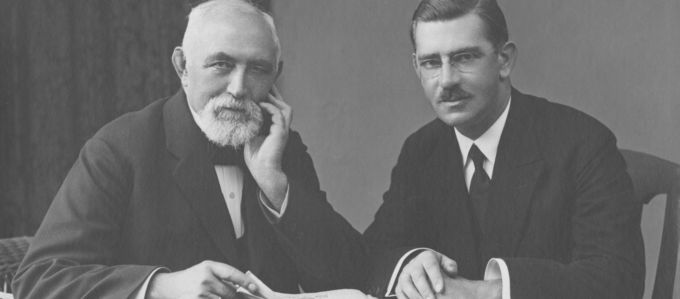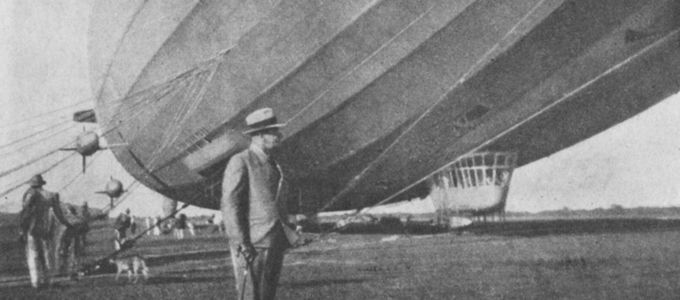
“It can never be said that the Apostle was a coward. I risked everything to help in the quick movement and furtherance of the Church work.” These words were written by the Chief Apostle’s right hand: Apostle Heinrich Franz Schlaphoff. Fifty years ago today he passed away.
Actually H. F. Schlaphoff was lamenting over the end of his career as a pilot when he wrote this in his diary. By then he was Assistant Chief Apostle, and the Chief Apostle had forbidden his assistant from piloting his own plane after thunderstorms and a lack of fuel had forced him down three times in one day.
He could never have reached his whole working area in his Stinson Monoplane anyway, because his work took him to nearly every continent. “I have appointed him as my assistant to work in places I will send him to,” Chief Apostle Johann Gottfried Bischoff said in the year 1951. Initially, H. F. Schlaphoff, who managed many crises during his time in office, had never even wanted to accept a ministry in the first place.
The son
Heinrich Franz Schlaphoff was born on 3 August 1894 and grew up in poor circumstances. His family lived in a corrugated-iron hut. During the Boer War, Heinrich Franz’s father lost his job so that the ten-year-old boy had to contribute to the family income as a paper boy. Over time he developed entrepreneurial skills—whether as a fishmonger, in the production of hospital supplies, or as a film distributor.
The family became New Apostolic on Pentecost 1902. Both father and son were very active in the Church. Only after his father repeatedly insisted, was Heinrich Franz willing to accept a ministry. In the year 1919 he was ordained as a Deacon and in 1921 as an Evangelist. This is how he supported his father, Apostle Georg Heinrich Wilhelm Schlaphoff. After the Apostle’s sudden death the son assumed the leadership of the Church in South Africa and was called into the Apostle ministry in July 1929. He forged ahead, and changes were not long in coming.
Assistant Chief Apostle
Without further ado, he stopped the practice of divine services being celebrated in the German language, and dissolved German-speaking congregations. From then on services were held in English and Afrikaans. He structured the District Church into Elder and Bishop areas, set up an accounting system based on the European model, and wrote weekly circulars to the ministers in three languages.
Putting the focus on the country’s national languages drew many new members into the Church—not only in South Africa, but also in South America and Australia. These regions, together with China, had been entrusted to Apostle Schlaphoff. In 1933 H. F. Schlaphoff was appointed as Assistant Chief Apostle for the entire Southern Hemisphere. By commission of the Chief Apostle, Assistant Chief Apostle Schlaphoff also handled difficult situations that had cropped up in North America and the Netherlands. “The achievements of that man are unique,” Chief Apostle Bischoff wrote in a letter in the year 1950.
The Chief
To South Africans, the Assistant Chief Apostle was known as the “Chief”. He continued to blaze new trails: he established welfare centres and a burial fund and began with the proclamation of Christ’s gospel to the Xhosa peoples. The Bible texts he issued for divine services often consisted of one to two dozen Bible verses—sometimes even the entire story. Holy Communion was dispensed only every two to four weeks. And congregational life in South Africa was a lot less strict than it was anywhere else: alcohol, cinema, dancing—nothing was taboo, as can be gleaned from letters of complaint that reached the Chief Apostle in Europe.
In September of 1951, the Apostles’ Council decided unanimously to revoke his commission as Assistant Chief Apostle. This way the worldwide Church would be “uniformly organized” it said in the Word of Life. In May of 1954 he was suspended as District Apostle of South Africa. In June he resigned from the Apostle ministry. In a service for ministers, the Chief Apostle said that H. F. Schlaphoff was still attending the services and could therefore not be considered as having renounced his faith.
The iron Apostle
Heinrich Franz Schlaphoff has gone down in history as the “iron Apostle”. He had acquired this reputation as a result of his tireless travels between South Africa, South and North America, Australia, and Europe, especially because he would allow nothing to deter him. Not even when he was shipwrecked off the coast of Brazil and was lost for two weeks, or when the FBI in the United States arrested him twice for allegedly being a German spy.
What was it again that he had written in his diary on 6 November 1937: “It can never be said that the Apostle was a coward. I risked everything to help in the quick movement and furtherance of the Church work.”










